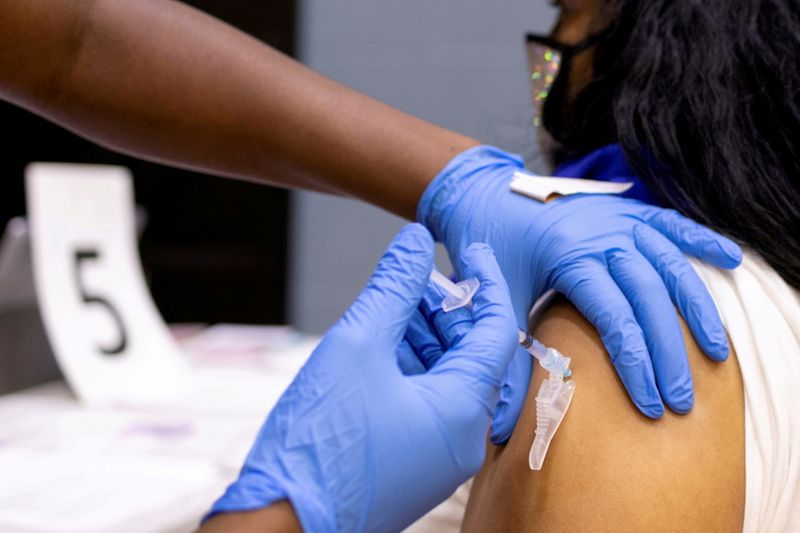By Julie Steenhuysen
(Reuters) - Arrival of the highly-mutated Omicron variant is a wake-up call to develop vaccines less susceptible to the rapid changes of the coronavirus, leading virologists and immunologists told Reuters.
Most first-generation COVID-19 vaccines target the spike protein on the outer surface of the SARS-CoV-2 virus used to infect human cells. Omicron has prompted alarm among scientists because it has far more mutations than earlier variants, including more than 30 on its spike.
Research to determine the extent to which Omicron evades immunity from existing vaccines or prior infection is underway.
New data on the Pfizer/BioNTech vaccine show some degree of reduced protection with the two-shot regimen.
Even if current shots remain effective for now, the dramatic evolution of the virus highlights the need for vaccines targeting parts of the virus less prone to mutate.
"One thing that is clear from Omicron is that the virus... is not going to go away," said Dr. Larry Corey, a virologist at Seattle's Fred Hutchinson Cancer Center who is overseeing U.S. government-backed COVID-19 vaccine trials. "There's a need for better vaccines."
Since the beginning of the pandemic, the coronavirus has morphed several times including into the more transmissible, globally dominant Delta variant. Still, COVID-19 vaccines have largely maintained their ability to protect people against severe illness and death.
As rapid response tools, the current COVID-19 vaccines are "outstanding," said Richard Hatchett, chief executive of the Coalition for Epidemic Preparedness Innovations (CEPI), an international coalition formed to prepare for infectious disease threats that has invested in many COVID-19 vaccines.
But more work - and money - is needed to manage the long-term risk. In March, CEPI called for $200 million in funding to develop vaccines that offer broad protection against SARS-CoV-2 variants, and other viruses in the same family such as MERS and SARS. "We need to keep investing as a hedge against a future that we can't predict," Hatchett said.
World Health Organization chief scientist Soumya Swaminathan said on Friday at the Reuters Next conference that next-generation vaccines are needed.
“We're working hard to support that research and development," Swaminathan said.
Most of the leading COVID-19 vaccines exclusively target parts of the spike protein that provoke strong immune responses, representing an early bet aimed at blocking infection.
The most dramatic of these are the messenger RNA (mRNA) vaccines, which initially had 95% efficacy against symptomatic COVID-19, far exceeding expectations. Their success has added billions in revenue and valuations for developers Pfizer (NYSE:PFE) and German partner BioNTech and Moderna (NASDAQ:MRNA).
An exception are COVID-19 vaccines produced in China by Sinovac Biotech and state-owned Sinopharm, which use an inactivated version of the whole SARS-CoV-2 virus, instead of singling out specific genes. Early studies suggested that antibody protection from those vaccines wanes rapidly, and protection may be limited in the elderly.
French biotech Valneva, whose vaccine uses an inactivated version of the whole SARS-CoV-2 virus, in October said its shot outperformed AstraZeneca (NASDAQ:AZN)'s, which targets the spike protein.
More recently, a British study showed Valneva's was the only shot out of seven that offered no immunity boost when given after two doses of the Pfizer/BioNTech vaccine.Valneva's vaccine is under review with the European Union's drug regulator.
For the immediate Omicron threat, most companies are working on new versions of their existing vaccines targeting the variant. AstraZeneca said it will soon have initial trial data on a vaccine focused on the Beta variant, which shares similarities with Omicron.
'A WORTHY EFFORT'
Several research groups and companies have started work on more broadly protective vaccines, such as those that target parts of the virus too essential for its survival to change. Experts caution it will likely take more than a year and generous funding to succeed.
"It's definitely a worthy effort," said Dr. Dan Barouch, a Harvard vaccine researcher who helped design Johnson & Johnson (NYSE:JNJ)'s COVID-19 vaccine. "It is not the answer for Omicron..., but it is potentially the answer for the next variant."
Moderna is researching how to target parts of the coronavirus less prone to mutate. Such a vaccine would need large-scale clinical trials that take months to complete, company President Stephen Hoge said.
Moderna is working on an Omicron-specific version of its vaccine and considering one that could address up to four variants.
"Realistically, I don't think those second-generation vaccine approaches are going to come to fruition in the next six to 12 months," Hoge said.
CEPI is providing $4.3 million to MigVax Corp, an affiliate of Israel's Migal Galilee Research Institute, which is developing an oral vaccine, and up to $5 million to the University of Saskatchewan’s Vaccine and Infectious Disease Organization. Both are in early development of potentially variant-proof vaccines.

CEPI is also investing up to $26 million to support work on a self-amplifying mRNA vaccine from Gritstone Bio aimed at fighting variants. Gritstone also has backing from the Gates Foundation and the U.S. government, with early-stage trials underway or soon to start.
Said Gritstone CEO Andrew Allen: "It's just a little naive to think that the vaccines that we made in the first few hot minutes of the pandemic are the best vaccines that we can make."